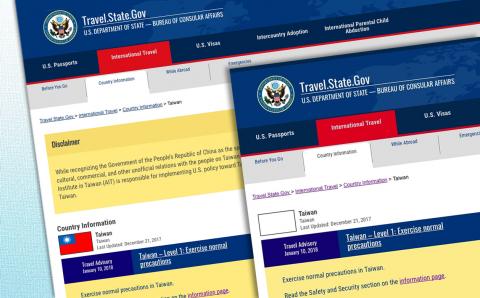The Ministry of Foreign Affairs yesterday expressed its disappointment over the removal of the Republic of China (ROC) flag from several US government Web sites, saying it has conveyed its grave concerns to Washington.
The ministry made the remarks hours after the Chinese-language United Daily News reported the disappearance of the ROC flag from the Web sites of the US Department of State’s Bureau of Consular Affairs and the Office of the US Trade Representative that displayed the flag on their introduction pages for Taiwan.
The newspaper published screenshots of the Taiwan introduction page on the US trade office’s Web site, one from June last year and the other from Tuesday, to show the removal of the flag.

Screen grab from the Bureau of Consular Affairs’ Web site
The US Department of State made the change on its Web site in September last year.
The ministry talked to the US about the matter several months ago, ministry spokesman Andrew Lee (李憲章) told a news conference in Taipei.
“That is why we found the latest flag removal from the Web sites of the two US government agencies not only unthinkable, but also unacceptable and disappointing,” Lee said, adding that Taipei has expressed its serious concerns to Washington.
The US had previously repeatedly reassured the ministry that Taiwan-US ties remained solid and that there was no shift in its policy, Lee said.
“However, we believe that such cases [the removal of the ROC flag] could influence the Taiwanese public’s perception of the status of relations between the two nations,” he said.
The ministry has taken note of Beijing’s increased attempts to use its “sharp power” to squeeze Taipei’s space within international organizations and oppress Taiwan on the supposedly free and open Internet, Lee said.
Such attempts are not conducive to the development of cross-strait ties, Lee added.
“Sharp power,” a term coined by the US-based National Endowment for Democracy, a non-profit organization that promotes democracy, refers to authoritarian efforts to “influence their target audiences by manipulating or distorting the information that reaches them.”
American Institute in Taiwan spokeswoman Sonia Urbom reiterated that the US’ policy toward Taiwan has not changed.
“The United States remains committed to our ‘one China’ policy based on the three joint communiques and the Taiwan Relations Act,” Urbom said.

Rainfall is expected to become more widespread and persistent across central and southern Taiwan over the next few days, with the effects of the weather patterns becoming most prominent between last night and tomorrow, the Central Weather Administration (CWA) said yesterday. Independent meteorologist Daniel Wu (吳德榮) said that based on the latest forecast models of the combination of a low-pressure system and southwesterly winds, rainfall and flooding are expected to continue in central and southern Taiwan from today to Sunday. The CWA also warned of flash floods, thunder and lightning, and strong gusts in these areas, as well as landslides and fallen

WAITING GAME: The US has so far only offered a ‘best rate tariff,’ which officials assume is about 15 percent, the same as Japan, a person familiar with the matter said Taiwan and the US have completed “technical consultations” regarding tariffs and a finalized rate is expected to be released soon, Executive Yuan spokeswoman Michelle Lee (李慧芝) told a news conference yesterday, as a 90-day pause on US President Donald Trump’s “reciprocal” tariffs is set to expire today. The two countries have reached a “certain degree of consensus” on issues such as tariffs, nontariff trade barriers, trade facilitation, supply chain resilience and economic security, Lee said. They also discussed opportunities for cooperation, investment and procurement, she said. A joint statement is still being negotiated and would be released once the US government has made

SOUTH CHINA SEA? The Philippine president spoke of adding more classrooms and power plants, while skipping tensions with China over disputed areas Philippine President Ferdinand Marcos Jr yesterday blasted “useless and crumbling” flood control projects in a state of the nation address that focused on domestic issues after a months-long feud with his vice president. Addressing a joint session of congress after days of rain that left at least 31 dead, Marcos repeated his recent warning that the nation faced a climate change-driven “new normal,” while pledging to investigate publicly funded projects that had failed. “Let’s not pretend, the people know that these projects can breed corruption. Kickbacks ... for the boys,” he said, citing houses that were “swept away” by the floods. “Someone has

‘CRUDE’: The potential countermeasure is in response to South Africa renaming Taiwan’s representative offices and the insistence that it move out of Pretoria Taiwan is considering banning exports of semiconductors to South Africa after the latter unilaterally downgraded and changed the names of Taiwan’s two representative offices, the Ministry of Foreign Affairs (MOFA) said yesterday. On Monday last week, the South African Department of International Relations and Cooperation unilaterally released a statement saying that, as of April 1, the Taipei Liaison Offices in Pretoria and Cape Town had been renamed the “Taipei Commercial Office in Johannesburg” and the “Taipei Commercial Office in Cape Town.” Citing UN General Assembly Resolution 2758, it said that South Africa “recognizes the People’s Republic of China (PRC) as the sole